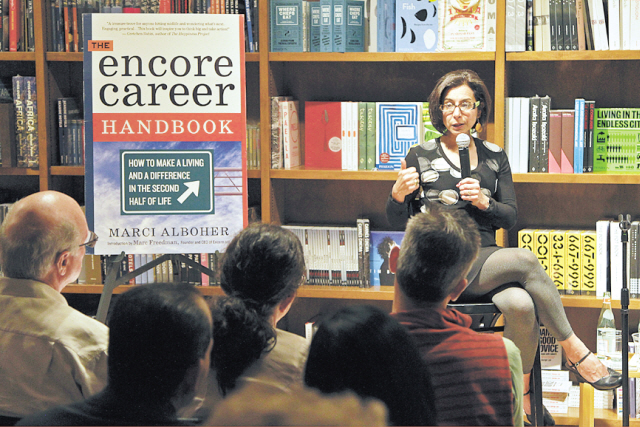Don Causey was beginning to plan his retirement, selling off his profitable sporting newsletters, when his life took a horrific turn. While on a safari on a long-anticipated trip to Africa, a tree tumbled onto him, breaking his back. The process of getting a medical transport to take him from a remote village back to Miami proved arduous and costly.
Today Causey’s back is healed, and at 70 he finds himself in a post-retirement career ― consulting for a company that sells travel memberships that include medical evacuation benefits. It’s a profitable part-time gig that Causey believes is an important service to travelers. Plus, he said, “It keeps my mind alive and keeps me connected with a community I care about, just in a different way.”
Like Causey, most Americans are crafting their own version of meaningful work in their later stages of life. It’s a direction that brings balance and an ability to be impactful in a whole new way.
 |
Author Marci Alboher, center, talks about her book “Encore Career” at Books & Books on Jan. 22, 2012, in Coral Gables, Florida. (Miami Herald/MCT) |
“More and more people ― sometimes by necessity, sometimes by choice ― are forgoing traditional retirement and investing a new state of life and work,” said Marci Alboher, author of “The Encore Career Handbook.”
Alboher is part of a movement that has named this later-in-life stage “encore careers,” paid or volunteer work that has a social impact. An encore career can last from a few years to 20 or more. While 9 million baby boomers already have entered their encore phase, another 31 million will soon make the leap in that direction, according to Encore.org, a nonprofit organization that promotes “second acts.”
The concept of an encore career is being buoyed by a convergence of trends: financial realities, layoffs, long life spans and the desire for a more purposeful existence during the aging process. “It’s a way to leave a mark that makes things better for future generations,” Alboher said. “But usually it’s not quick or easy. It’s a slow metamorphosis involving baby steps, detours, persistence, creativity and a do-it-yourself spirit.”
An encore career job might be a nurse or health aide. It could be a teacher, tutor or fundraiser, founder of a nonprofit, or even an entrepreneur that solves a social problem. For many, it has become the answer to “now what?” and “what will be my legacy?”
Knowing what’s ahead, some people plan their encore career for years, beginning as early as their 50s. They use travel time to build alliances or weekends to take a community college course.
Though he’s far from retirement age, my 50-year-old husband surely will need an encore career. Even now, he can’t sit still on days off from work, filling his days with house projects and coming up with new ones once the current list is exhausted. Yet he regularly talks about how he looks forward to retirement ― a disaster in the making for a man without a mission.
The reignite-rather-than-retire movement has been recent, but it may already have played a role in curbing the high rate of suicide for older males. David Cohen, a professor of psychology at University of Texas, had previously discovered a high rate of suicide for males in the 65-to-74 year old age group, observing that this set was susceptible because of its preoccupation with lost status and higher risk of apathy and isolation. That high rate has lowered in recent years.
Vicki Cerda, 53, already has begun her transition. After 20 years as an information technology trainer for Florida Power & Light in Miami, her position was eliminated. Today, Certa splits her time between a seasonal paid job as a conference planner and a volunteer work for a nonprofit organization, e-learning for Kids Foundation, which provides free educational workshops on the Internet for children ages, five to 12. The teachers are volunteers, too. “This is cool because it’s an encore career that I can do from anywhere and I feel like I’m making a difference,” she said.
Yet, the transition phase requires an emotional adjustment or identity shift. And finding new ways to use skills, contacts and instincts may take time. “You may feel like what some have started calling ‘a previously important person,’ ” Alboher said.
Patterns of reinvention vary but often, encore careers start with volunteer gigs that get parlayed into full- or part-time paid work. One Miami woman I met volunteered to sit on the board of a theater company because of her love of the arts. In that position, she discovered she was good at fundraising. Now she’s a paid employee, raising money for a nonprofit.
A later-in-life job could be completely unrelated to what you previously were doing for a living. It might even evolve from a hobby or interest. In her book, Alboher describes how one senior’s love of sailing led him to an encore career with a sailing program for Boy Scouts of America.
Alboher said figuring out your encore career requires a personal process of exploring, building a network, getting necessary training, seeking out opportunity and brainstorming ways to create your own role. You might want to consult with a career coach or a friend in the same life stage, or one of the growing number of organizations focused on helping people through an encore transition. In Miami, for example, the local branch of the national ReServe organization matches professionals over age 55 with part-time paid placements at nonprofits and public agencies.
By Cindy Krischer Goodman
(The Miami Herald)
(MCT Information Services)








